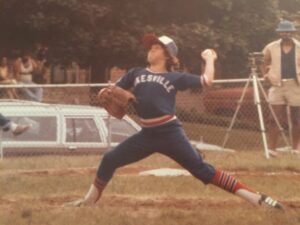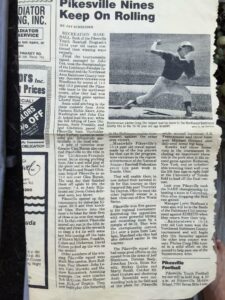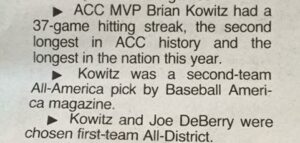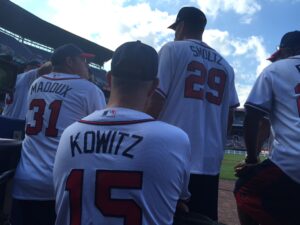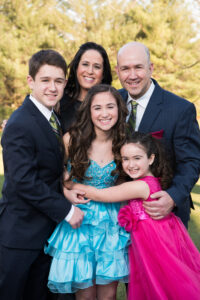It’s as close to a sure thing as death and taxes… as a matter of fact if you haven’t experienced it you certainly aren’t living, or at least living right.
It’s the “F” word. Failure.
But how many of us feel it, experience it, embrace it and learn from it – not only how to handle it, but how to climb back from the depths?
There’s only one thing worse than failing, it’s not trying.
If you at least try, you win, even though victory may be deferred. It becomes part of who you are and a big part of your story.
After all, everyone has a story.
I am Mark Brodinsky and this is The Sunday Series.
The Sunday Series (123): Fail to Succeed!
Is it possible that life is really a game? Could be, if the game you play is the one most like life… baseball.
Go ahead, pick up a bat, a ball and your glove and get ready to feel it… failure, deep, unrelenting, sometimes unreal. Yet there is great joy – because only you can make it happen – pure success and gratitude extracted from the grind, from the jaws of defeat – if you can take it, you can make it.
This is baseball. This is life. This is all Brian Kowitz wanted to do with his life – just play the game.
“I still remember as a very young kid playing catch in the backyard with my Mom. My dad was working, so my mom would play ball with me… usually at my request. One day my mom says to my dad -‘ you gotta get Brian in a league. I think when I watch him play with me and with his friends he just looks… different.'”
Brian was different, but in a good way: “My parents signed me up for the Pikesville Baseball League, (in Baltimore Maryland). I remember being nervous, but I did fine. What was catching the coach’s eye was how I tracked the ball, how I got jumps on the ball. I mainly played outfield. After practice my dad would hit me fly balls, hitting balls as far and as high as he could. I was catching them, every single one.”
Brian is a lefty. A rare and coveted natural trait, especially in baseball. And he was in love. “I loved baseball. I loved the game”, Brian says. “I loved hitting, fielding, just being outside and being able to run down balls and compete. I loved the pitcher vs hitter, the face-off. Even at an early age I loved the nuances of the game. In baseball anything can happen, it’s fairly unpredictable. And just knowing my size, 5’9″, I was not a big kid, but I was always successful at the game. It doesn’t matter how big you are, if you can run, field and hit, you can do it.”
Despite his smaller stature, Brian also played two other sports, where supposedly size matters. Yet he was one of the leading scorers in basketball at Boys Latin and a star in football for the same school. He did it all – he played quarterback, returned punts, returned kickoffs and played as a defensive back.
“I was a sports junky”, says Brian. “I loved to compete. I worked so hard and prepared. I would line trash cans up in my driveway and dribble around them. I would pick up a baseball and hit in empty fields all by myself. I put pressure on myself to be as good as I can be. There was a fire inside me, it kept driving me. I didn’t want to let myself down. I feared failure.”
Failure. A word that strikes fear into us as humans. It’s a word and a feeling which can drive us to seek out diversions and distractions. Run from the pain, hide from the possibilities of failure at all cost.
For all the success he had on the field with athletics and baseball, Brian’s hard work and obsession with sports was serving to mask a different kind of pain. A pain which could no longer be buried, which demanded attention, or risk losing all he had gained.
Brian was lost.
Lost at school, lost in academics, lost in the fundamentals of learning. He could track a high fly ball with the best of them… but he couldn’t follow a simple lesson in the classroom. For years he was falling behind. On the diamond he was in heaven, in school it was a living hell. It wasn’t discovered until his younger brother David, who was already struggling as early as kindergarten, got tested – then Brian got tested – and all the confusion became clear – both boys were battling dyslexia.
Brian remembers it well: “I didn’t know what the hell was going on in school, everything was moving at a pace way beyond my ability. I remember very specific instances in 3rd, 5th and 7th grades, I was mortified because I had no idea what was going on. To compensate for my deficiencies in the classroom I really, really gravitated to athletics. Then in 8th grade I went to Jemicy School, so did my brother. There they gave us the tools and strategies and taught us how to approach learning in a way which allowed us to handle the dyslexia. You don’t cure it, you find strategies to live with it. They saved my brother’s life and mine. We wear it is a badge of honor. We are proud of it. Jemicy was a game changer.”
The changes stuck. In high school at Boys Latin Brian made the honor roll, when he got to college he was an Academic All-American. The worlds of sports and learning were merging, making Brian’s world a better place to be. At age 16, while playing in a summer baseball league Brian was discovered by Clemson University. He ended up signing a letter of intent to attend Clemson right there in his high school parking lot, on the hood of his dad’s car.
“Going to Clemson was a huge jump”, says Brian. “My size continued to be a question mark for all the coaches I played for, but especially in college. The first time the Clemson coach met me he said, ‘Where’s the rest of you? How you gonna play here?’ I said not only will I play here, I’m going to start for you as a freshman.”
Brian continues, “my first collegiate game I went 2-for-4 with two doubles. It was crazy, surreal. My 3rd collegiate game my coach was still convinced that being a lefty I couldn’t hit left-handed pitching. The University of Georgia starts a left-handed pitcher so the coach doesn’t play me. But as soon as they bring in a right-handed reliever he puts me in. I hit a bases-loaded single to drive in two runs. Then in the bottom of the 11th inning, in a tie ballgame, Georgia brings in a 6’7″ left-handed pitcher. The coach leaves me in to hit. The first pitch I see I hit one over the 405 mark in dead centerfield to win the game. As I rounded 3rd base my coach shakes my hand and says ‘Goddamn Kowitz you can hit lefties.’ After that I was in there every day.”
In only his sophomore year the Clemson baseball team won the ACC Championship. And in his junior year at Clemson Brian opened the season with a 37-game hitting streak, the longest hitting streak in the nation that year. He was named ACC Player of the Year. In three years at Clemson Brian only committed one error in the outfield.
But it wasn’t all magic. After all, it’s baseball. When the struggles came, when the failure at the plate reared its ugly head, doubt crept in. Brian says, “I remember standing in the outfield with tears in my eyes wondering if I can do this. But adversity teaches you to adapt and to overcome. You can’t be afraid to fail.”
Failure is nothing but success deferred. By his junior year in college Brian was drafted by the Atlanta Braves in the 9th round.
“I got drafted and reported to Pulaski, Viriginia for what is considered short-season A ball. I worked my way through the system, Double-A, Triple-A and back again. I loved every moment of it. The work, the outfield practice and running and lifting in West Palm Beach. I remember standing in the outfield staring at the palm trees and the beautiful tall buildings and thinking I can’t believe this is what I’m doing for a living. To me there was nothing that could ever compare.”
Nothing, until he got the word he was going to The Show. “I was playing for the Richmond Braves in a game against the Pawtucket Red Sox”, says Brian, “when Grady Little called me into his office. He told me Braves right-fielder David Justice had just gotten hurt and was going on the disabled-list. He told me I was going up to the big leagues and would meet the team in Atlanta to play the Astros.”
There’s a reason they call the centerpiece of the baseball field a diamond, not only its shape, but at this level, the 750 human beings who stand on it in the infield and behind it in the outfield, are truly diamonds in the rough, the best players in the world. Brian Kowitz was about to join them. All the hard work, the dedication, shagging countless fly balls, hitting until his hands bled, working out until he was physically ill, he wanted it so bad he wouldn’t stop until he had given it everything he had. It was all paying off.
“My first at-bat in the big leagues I came into pinch-hit for pitcher Tom Glavine”, remembers Brian. Shane Reynolds of the Astros was on the mound and the first pitch I saw from him I hit an RBI double down the left-field line. What a thrill. Then the first ball ever hit to me I was playing right field and I had to jump up against the wall to catch it.”
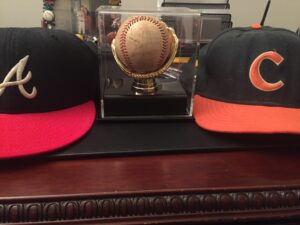
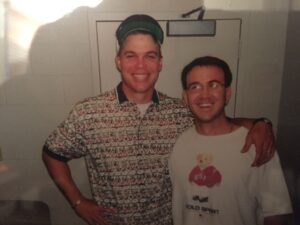
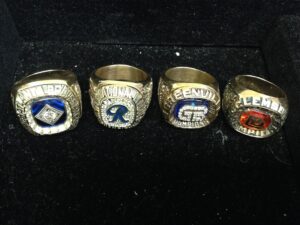
But his new life was beginning. With many an athlete that transition from the athletic field to the business world can be a tremendous challenge. As Brian recalls, “for so many years I had done all my talking with my bat, glove, arms and legs. But I came home in 1996 and got right into the mortgage business. I didn’t know anything about it, all I knew was baseball. My uncle taught me the business. I just worked really hard, kind of dove right in and took to it pretty well. When the regulations changed it became a very difficult business to continue and that’s when I reinvented myself and got my insurance licenses and opened my own agency. In the last three years, partnering with Steve Heller, we have grown that business over eight times what it was when it began. It’s been great.”
There’s also the family. Brian married his wife Amy during the off-season following his stint with the World Champion Braves. The couple was wed on New Year’s Eve 1995. Brian says the feeling he had standing in the outfield during his six years in professional ball – thinking nothing could compare – was easily dwarfed by the creation of his family and the births of his three children: Cory, Makenzie and Lucy.
Now the business of Brian’s life is not just business, but giving back to others, including ex-athletes who have a tough time transitioning to the “real world”. It’s called the Corporate Huddle. “A lot of athletes get caught up looking for the adrenaline rush again”, says Brian. “What really helped me was I realized I was never going to be able to fill that void. Professional baseball was something I did and I had a great time in my life, but it is impossible to replace, so why try.”
Coaching his kid’s baseball and basketball teams Brian shares his message and experience about competing in sports at the highest level, because no matter where you are the fundamentals of success are the same: “My message to the kids is have fun, but believe in yourself and don’t be afraid to fail. I’ve never been afraid to fail. You cannot play professional sports if you are afraid to fail. I was never afraid to get out there and look like a fool on the field. And in the transition into business I was never afraid to get out there and try to attain clients and not be successful because I played a game that was all about failure. I have the ability to redefine what success is. I’ve failed again and again, just so I could succeed.”
Until next time thanks for taking the time,
Mark
Join the Tribe!
Enter your name & e-mail address into the box on the blog and get posts sent directly to your inbox!
Author: The #1 Amazon Best Seller: It Takes 2. Surviving Breast Cancer: A Spouse’s Story
(http://www.amazon.com/Mark-Brodinsky/e/B00FI6R3U6)
Huffington Post: (http://www.huffingtonpost.com/mark-brodinsky/)
The Profile: (http://www.talkinggood.com/profiles/MarkBrodinsky)
The Podcast: (https://itunes.apple.com/us/podcast/sunday-series-courage-inspiration/id1028611459)
Affordable Health Coverage: USHEALTH Advisors: http://www.ushagent.com/markbrodinsky

